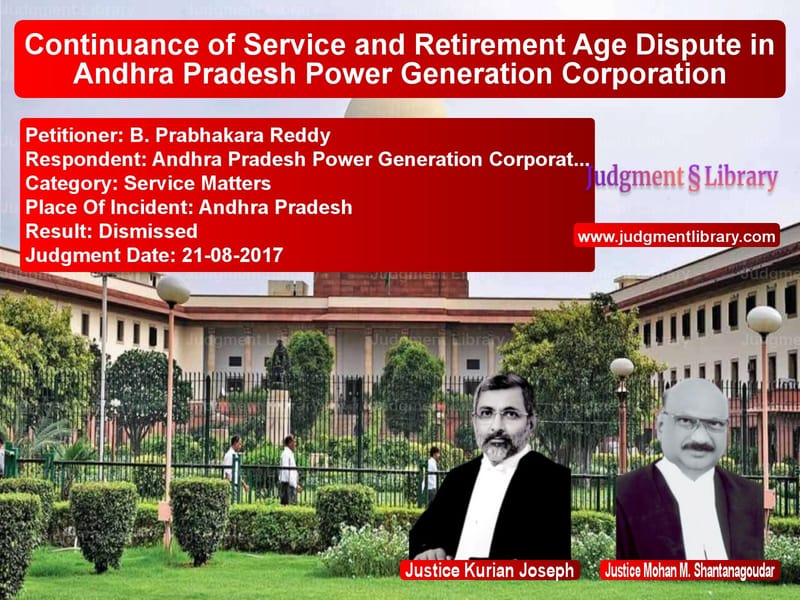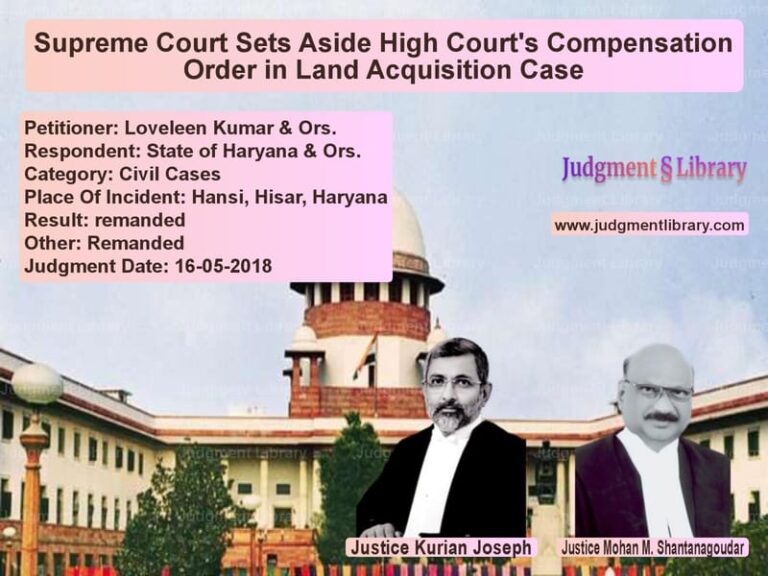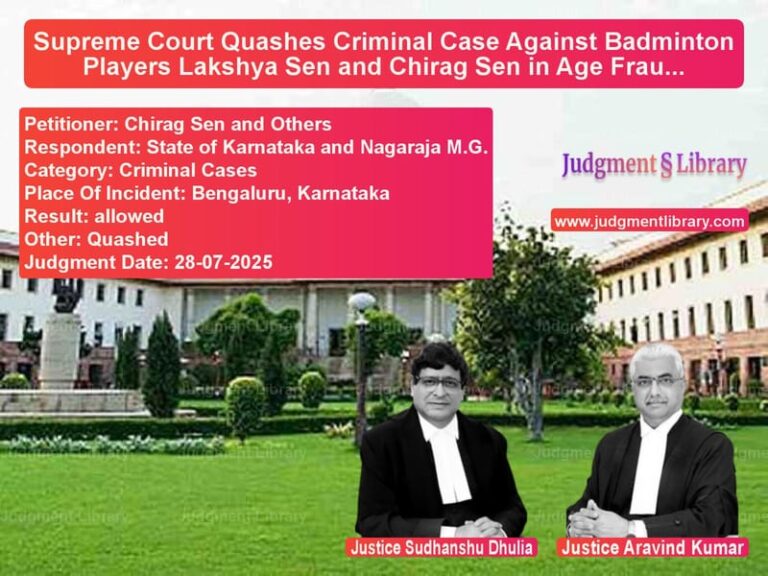Continuance of Service and Retirement Age Dispute in Andhra Pradesh Power Generation Corporation
This case concerns a dispute between B. Prabhakara Reddy (the appellant) and the Andhra Pradesh Power Generation Corporation Ltd. (the respondent) regarding the appellant’s claim for continuance in service until the age of 60. The appellant had sought to challenge the decision that limited his service beyond a certain age. The matter, which was connected to previous cases, raised important issues about employee rights, age limits for service, and the discretion of state-owned companies in setting retirement policies.
Background: The appellant, B. Prabhakara Reddy, had filed appeals concerning his continuance in service until the age of 60. He argued that the retirement age should not be a rigid cut-off, especially for employees who had served diligently. The issue at hand was whether employees of the Andhra Pradesh Power Generation Corporation Ltd. could be allowed to continue in service beyond the age set by the company’s internal policies. The matter was disposed of by the Court in accordance with previous judgments, particularly the judgment dated 9th August 2017, which had addressed similar issues in related cases.
Petitioner’s Argument: The appellant’s counsel, Mr. Y. Vismai Rao, argued that the appellant should be allowed to continue in service up to the age of 60, citing that such an extension was common in many service contracts. The appellant contended that the company’s policy of setting a lower retirement age was arbitrary and lacked reasonable justification. Furthermore, it was asserted that the appellant had served the company diligently and should not be forced into retirement before reaching the age of 60, which is generally considered a fair age for retirement in many sectors.
Respondent’s Argument: The Andhra Pradesh Power Generation Corporation Ltd., represented by its counsel, opposed the appellant’s claim. The respondents argued that the retirement policy set by the organization was in line with the regulations governing public sector companies, and there was no legal obligation to extend the service of the appellant beyond the set retirement age. The respondents emphasized that the retirement age had been fixed in accordance with the needs of the organization and to maintain a dynamic workforce.
Court’s Ruling: The Supreme Court, after reviewing the case, disposed of the appeals in line with the earlier judgment, which had addressed similar issues in connected cases. The Court granted leave to the appellant but ultimately did not interfere with the existing retirement policy. The appellant was not granted the extension to continue in service until the age of 60, and the Court upheld the decision of the lower courts. The Court found that there was no legal requirement to modify the company’s retirement policy, and the appellant’s request for an extension was not legally justified under the circumstances.
Key Points from the Judgment:
- The Court granted leave to the appellant to pursue his claim, but the appeal was ultimately disposed of in terms of the earlier judgment, which had addressed similar issues.
- The Court upheld the organization’s retirement policy and did not find sufficient grounds to extend the appellant’s service beyond the age specified by the organization.
- The judgment reinforces the discretion of public sector organizations in setting policies related to employee retirement, provided such policies are not arbitrary or discriminatory.
- The decision also highlights the Court’s approach to ensuring that retirement age policies are not subject to individual challenges unless they contravene specific legal provisions or constitutional rights.
Conclusion: This case emphasizes the importance of adhering to organizational policies, especially in public sector companies, regarding retirement ages. While employees may seek extensions based on their service record, the Court’s decision underscores that retirement policies are generally considered binding unless there is a clear violation of law. The judgment serves as a reminder that while the interests of employees are important, organizations have the discretion to manage their workforce in accordance with established guidelines.
Don’t miss out on the full details! Download the complete judgment in PDF format below and gain valuable insights instantly!
Download Judgment: B. Prabhakara Reddy vs Andhra Pradesh Power Supreme Court of India Judgment Dated 21-08-2017.pdf
Direct Downlaod Judgment: Direct downlaod this Judgment
See all petitions in Employment Disputes
See all petitions in Public Sector Employees
See all petitions in Termination Cases
See all petitions in Judgment by Kurian Joseph
See all petitions in Judgment by Mohan M. Shantanagoudar
See all petitions in dismissed
See all petitions in supreme court of India judgments August 2017
See all petitions in 2017 judgments
See all posts in Service Matters Category
See all allowed petitions in Service Matters Category
See all Dismissed petitions in Service Matters Category
See all partially allowed petitions in Service Matters Category







